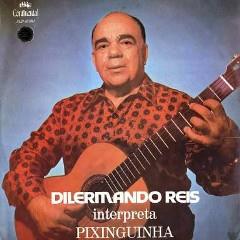Dilermando Reis - Interpreta Pixinguinha (1972)
Dilermando Reis - Interpreta Pixinguinha (1972)

A1 Carinhoso A2 Lamentos A3 Cheguei A4 Ingênuo A5 Cinco Companheiros A6 Vou Vivendo B1 Naquele Tempo B2 Chorei B3 Cochichando B4 Segura Ele B5 Urubatan B6 Proezas De Solon Dilermando Reis - guitar
Consisting of 11 solo guitar arrangements of pieces by the celebrated Brazilian composer, Pixinguinha, this is the long-awaited new release from Roland Dyens - his first since Night and Day in 2003.
On May 13, 1888, (25 years after slavery was abolished in the United States), while the Brazilian King was away, Princess Isabel signed the 'Golden Law' which freed all slaves in Brazil without compensation to their owners. Ten years later a black Brazilian born Alfredo da Rocha Vianna, Jr. was destined to experience discrimination in both his private and professional life. His grandmother called him 'Pinzindim' which is said to mean, 'Good little boy.' This evolved into 'Pixinguinha' (pronounced, 'Pish-in-GUI-nia').
It is hard to overstate the importance of Pixinguinha's impact on modern music. A genius of samba and a musician's musician, he dedicated himself to choro and never compromised his standards of excellence. He was a composer, arranger, virtuoso instrumentalist, band leader and teacher; Pixinguinha was Brazilian music. Primarily known as a virtuoso flautist, Pixinguinha in fact recorded more on saxophone than on flute. He opted for the tenor sax in the early 1920s when they began playing in larger venues and he realized that his band, the 'Oito Batutas' (Great Eight), needed a bigger sound.
Pixinguinha became the musical ambassador for Brazil. When the King and Queen of Belgium visited Brazil in 1920, the Oito Batutas played for them. Pixinguinha went on to delight the European aristocracy when the group toured there in 1922. In 1940 the renowned conductor Leopold Stokowski asked Heitor Villa-Lobos to select a few musicians for a series of recordings that would present the best of Brazilian Popular Music. Among the first musicians Villa-Lobos contracted was a musician with sparkling original melodies - Pixinguinha.
In July, 1972 he lost his beloved wife, Albertina. On February 17th, 1973, while attending the church baptism of his grandson in Ipanema, Pixinguinha died. The next day newspapers ran this headline, 'THE HEAVENS CRY!' His funeral was attended by thousands who spontaneously began singing his famous composition Carinhoso. Pixinguinha has been called 'The Cole Porter of Brazil' and he is recognized as 'The Father of the Choro.' He is an icon of Brazilian music and his music is enthusiastically played today by all musicians in South America.
When asked about the influence of Pixinguinha, he replied, 'He's a genius: a blessing and an inspiration for my life.' - Antonio Carlos Jobim
'If I had to write the whole History of Popular Brazilian Music in 15 volumes, it wouldn't be enough at all, no question. But if I only had to write one and only word, then I would only select that one: Pixinguinha.' - the Brazilian musician and historian, Ary Vasconcelos
'The choro is definitely the most developed and sophisticated genre of all Popular Brazilian Music. There are millions of choros existing but the very best are definitely by Pixinguinha.' ---the Brazilian composer, Radames Gnattali
download (mp3 @320 kbs):
yandex mediafire ulozto gett bayfiles








